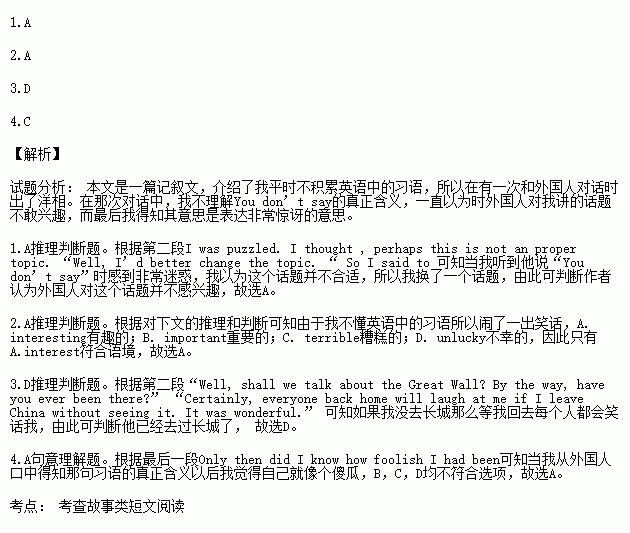题目内容
A year ago, I paid no attention to English idioms, though my teacher emphasized(强调)the importance again and again. But soon, the importance of English idioms was shown in an amusing experience
One day, I happened to meet an Englishman on the road, and soon we began to talk. As I was talking about how I was studying English, the foreigner seemed to be surprised . Gently shaking his head, shrugging his shoulders, he said, “You don’t say!” “You don’t say!” I was puzzled. I thought , perhaps this is not an proper topic. “Well, I’d better change the topic. “ So I said to him, “Well, shall we talk about the Great Wall? By the way, have you ever been there?” “Certainly, everyone back home will laugh at me if I leave China without seeing it. It was wonderful.” He was deep in thought when I began to talk like a tourist guide. “The Great Wall is one of the wonders in the world. We are very proud of it.” Soon I was stopped again by his words: “You don’t say!” I couldn’t help asking, “Why do you ask me not to talk about it ?” “Well, I didn’t ask you to do so,” he answered, greatly surprised. I said, “Didn’t you say ‘you don’t say’?” Hearing this, the Englishman laughed to tears. He began to explain, ‘You don’t say.’actually means ‘really’! It is an expression of surprise. Perhaps you don’t pay attention to English idioms.” Only then did I know how foolish I had been. Since then I have been more careful with idiomatic expressions. Remember: what the English teachers said is always right to us students.
1.At first, on hearing “You don’t say”, I thought the foreigner meant____.
A. He was not interested in the topic
B. He was only interested in the Great Wall
C. I had talked too much
D. I had to stop talking
2.The underlined word in the first paragraph probably means____.
A. interesting B. important
C. terrible D. unlucky
3.Which of the following is true according to the passage?
A. The Englishman left China without seeing the Great Wall.
B. The Englishman wanted to see the Great Wall after I talked about it.
C. The Englishman wanted me to act as his guide.
D. The Englishman visited the Great Wall and thought it worth (值得) visiting.
4.After the Englishman explained the idiom, _____.
A. I thought the Englishman had made me a fool.
B. The Englishman became a real fool.
C. I felt very foolish
D. I became more careful in everything.

